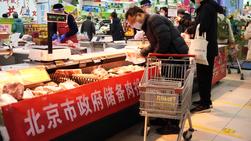 People shop for pork at a supermarket in Beijing on Saturday. (NG HAN GUAN / AP)
People shop for pork at a supermarket in Beijing on Saturday. (NG HAN GUAN / AP)
Authorities in several Chinese regions eased COVID-19 restrictions to varying degrees on Tuesday, slowly and steadily adopting a new approach to deal with the virus and making life less regimented for the people.
In Beijing, where commuting rules have already been relaxed, visitors were allowed to enter parks and other open spaces, and most restaurants resumed dine-in services after nearly two weeks.
People are no longer required to take a nucleic acid test every 48 hours and show the negative result before entering public places such as supermarkets, malls and offices. However, they are required to scan the health code.
Some indoor places such as eateries, internet cafes, bars and karaoke rooms and certain institutions such as nursing homes, welfare homes and schools will still require visitors to show a negative nucleic acid test result within 48 hours for entry.
Beijing Capital International Airport and Beijing Daxing International Airport also lifted the 48-hour negative test rule for passengers, who since Tuesday need only to scan the health code when entering terminals.
In Kunming, Yunnan province, authorities began allowing people who are fully vaccinated to visit parks and attractions from Monday. They don't need to show a negative nucleic acid test result, but scanning the health code, showing their vaccination record, monitoring their body temperature and wearing masks remain mandatory, officials said.
Twelve cities and counties in Hainan, including Haikou, Sanya, Danzhou and Wenchang, said they would no longer implement "region-specific management" for people arriving from outside the province, according to notices issued on Monday and Tuesday, a move that promises to draw more visitors to the tropical region.
Sergei Orlov, 35, an entrepreneur from Russia and a travel marketer in Sanya, said it was a golden opportunity for the tourism business in Hainan to recover.
According to Qunar, a domestic online travel agency, the search volume for Sanya's inbound air tickets jumped 1.8 times within an hour of the notice about the city on Monday. Ticket sales surged 3.3 times compared with the same period on Sunday and hotel bookings also tripled.
Those visiting or returning to the province have been advised to self-monitor for three days upon arrival. They have also been asked to avoid social gatherings and crowded places. Anyone who develops symptoms such as fever, dry cough or loss of taste and smell must seek immediate medical advice, according to the Hainan Provincial Center for Disease Control and Prevention.
As more regions ease COVID control measures, the hospitality, tourism and transportation industries are expected to take baby steps toward recovery.
Data from Meituan, an on-demand service platform, suggest that the key phrase "surrounding tour" has been searched very frequently in cities such as Guangzhou, Nanning, Xi'an and Chongqing over the past week.
Tongcheng Travel, a major online travel agency, indicated that the number of weekend ticket bookings for scenic spots in Guangzhou had phenomenally increased.
Fliggy, Alibaba's travel portal, said that outbound air ticket bookings in popular cities such as Chongqing, Zhengzhou, Jinan, Shanghai and Hangzhou doubled on Sunday.
Wu Ruoshan, a special researcher at the Tourism Research Center of Chinese Academy of Social Sciences, told The Paper that in the short term, market prospects for winter tourism destinations and New Year traveling were promising.
Wang Songsong and Chen Meiling in Beijing contributed to this story.
Contact the writers at dujuan@chinadaily.com.cn



